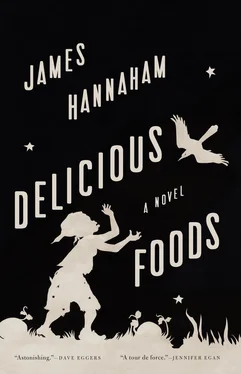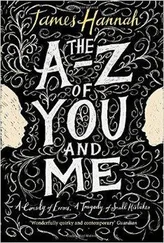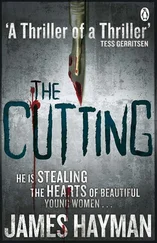I’m looking for my mother, he blurted.
The gravity of the matter seemed to settle in her body, as if the same thing had once happened to her. Oh, it’s like that, she said. She on the street, hmm?
I reckon. I’m not sure where she is, ma’am.
The name Darlene Hardison did not sound familiar to the woman. Out here, she said, a lot of people — the names aren’t the names, you know. What she look like?
Like a normal mom.
You gotta do better than that, my dear. How tall, how fat, how black. Big boobs, small boobs, big ass — what her hair like? Natural, straight, weave, dye? Scars, tattoos. What she was wearing. Who she was with.
Nothing helpful came to mind. Vague adjectives orbited his head. Pretty. Nice. If he didn’t find her that night, he would need a picture. He struggled to create an image of his mother with his undeveloped tools, and watched his failure reflected in the woman’s blank expression. He could not handle this alone, but he didn’t let that thought enter his awareness. He had to hold back a riot in his chest that made him want to shout, or kick the bus shelter, or himself.
A gleaming white town car slowed at the bus stop. The woman broke Eddie’s gaze, flicked her unfinished cigarette to the ground, smashed it into the pavement, and leaned her torso into the window of the car. Loud rap music from inside drowned out their conversation. A voice whined, Don’t believe the hype! Presently the woman turned back and smiled. This my ride. She swung the door wide, leapt in, and slammed it. In Eddie’s imagination she became his mother, who might have done the same things, recklessly stepping over the line into danger, into oblivion, and — worse than wrapping herself in a stranger’s murderous arms, worse than dying — leaving him behind.
Only then did a vivid picture of his mother come to him. Slim, her edges round like a soap sculpture in the rain, fuller hips than her frame seemed able to support. She straightened her hair and kept it at shoulder length. She wore sleeveless floral sundresses in muted patterns and flat shoes — in particular he remembered a mustard-colored pair. At the old house, in Ovis, she would garden from October to May, when it wasn’t too hot to spend time in the yard, and she dreamed of getting a sprinkler system for the lawn. He remembered eating a certain brand of chocolate sandwich cookie that matched her complexion, not the deep brown of stained wood but lighter and ruddier, like cedar-bark chips. She had grace, and painted her finger- and toenails a respectable shade of plum. A night sky of faint dots spread across her face, maybe from an adolescent ’bout with acne. He remembered sitting in her lap and tracing these constellations while she slapped his hands away. The makeup she used always compensated for the spots. These were some of Eddie’s earliest memories, which always gradually gave way to something else, as if Darlene had pulled a zipper and the halves of her body had fallen away, like a husk, to unmask another person.
This mental image lasted only as long as the flashing red sign that told him not to walk. Hazier still was the gap between that image and the woman he couldn’t find that night. Eddie’s father had also disappeared, nearly six years earlier, and they’d found him dead. During the Vietnam War, he knew, his father had flown an airplane, and after that, in college, he had played basketball. Eddie’s father must have done his job as a soldier well because he wore a medal in the shape of a silver star over his heart in that photograph near his mother’s bed. That’s for bravery, his mother had said, so often that he could say it with her. Charlie didn’t get your daddy, no sir. He had to come home to Jim Crow for that. Then she’d laugh, but not a funny laugh.
Eddie did a lot of asking that night. He encountered many peculiar people, etched in fluorescent light outside ratty convenience stores, walking across empty parking lots whose fault lines sprouted crabgrass and sparkled with nuggets of safety glass, peeking from inside dark concrete motel rooms with broken doors. Nobody remembered Darlene; some people did not know if they remembered remembering. Others forgot that they did not remember. Some spoke fast, for a very long time, and did not stop. Some people could not form words.
One skinny lady with sunken eyes claimed that she definitely had seen Darlene. Without question, she said, absolutely, on this very road. But she also insisted that it had happened ten years ago. We shared a slice of pizza, she went on, because we only had enough money for one, and your moms wanted olives on it, I member that clearly, and we had a little argument about that because I hate olives.
Eddie somehow knew not to mention that his mother also hated olives.
Minimart clerks at gas stations shrugged, a man in a tool belt who claimed to be an electrician said he lived two hours away in Nacogdoches, and a nervous man with slick black hair and a tattoo of his dead Rottweiler on his naked pec kept reaching into the small of his back and telling Eddie, You better go home, kid, ’cause shit’s finna go down right the fuck here, son. He pointed to the ground with both index fingers. Eddie met two kids younger than himself who wanted money for a Butterfinger. At first they threatened him verbally, but after he turned his pockets inside out and explained his journey, one of them offered to help him find his mother. Eddie declined, and as he walked away sideways, it occurred to him that nobody else had volunteered to help. Two or three dark sedans slowed by the roadside, powering down their tinted passenger-side windows. Eddie ran from them.
On his second night of searching, drawn to the bright pink and orange of a 24-hour donut shop, he thought he might finally find people inside who would not only know and remember but also know what they knew and remember what they remembered, and have some of it turn out true. He understood that he couldn’t rely on the night people, who frightened and angered him, and he experienced a deep burn in his stomach when he thought about how his mother had joined them or died with them, like his father, and at best they had engulfed her and made her vanish into this ruined land where true and false didn’t matter, where the differences disappeared among memories, dreams, and a young man standing in front of them asking a desperate question.
Not long after Darlene arrived at Grambling State University, she gained a sorority sister, Hazel, who transferred in from Florida State. Hazel had a vivacious, confrontational attitude, fueled by her determination to override the social strikes against her — a mahogany complexion, features too small to fit her face, a large mole muscling in on her nose, unusual height for a woman, a tough demeanor.
All this Southern gentility baffles me, Hazel sometimes said. I always feel like I’m playing the trumpet at a tea party. She made up for her brashness with camaraderie. Hazel organized the group’s bowling outings, oversaw the decoration of the house, and made an astounding barbecued brisket packed with smokiness. Her flowing red-and-turquoise blouses often had African designs or palm trees printed on them, and the loud clothing seemed to complement her frank conversation — often about her main vices, chocolate, bourbon, and sex — and her bawdy sense of humor. Everybody took to her, especially several doe-like, unremarkable Sigma Tau Tau sisters, and Darlene, who, as she grew into womanhood, joined Hazel’s shocked but delighted audience and found it hard to avoid imitating her infectious insolence. April Woods, a light-skinned, straight-nosed, and polite senior beauty queen, served the function of official role model, but Hazel’s charisma got everybody wearing brighter clothing. She loosened their tongues, their attitudes, and their belts.
Читать дальше












